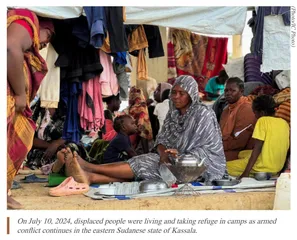Regional Security Governance in the Horn of Africa and China’s Role
作者: He Wenping

The Horn of Africa (HoA) is a region of geographical significance, as it locates on the northeast of the African mainland, extends into the southern coast of Gulf of Aden, connects Asia, Africa and Europe, and faces the Red Sea. In recent years, it has faced numerous security challenges posed by both internal conflicts and external interventions, making it one of the most volatile regions in the world. As China and HoA countries have maintained close political, economic and cultural exchanges and cooperation, security governance in the region concerns not only its own security and the security of Africa by and large, but also that of Chinese investment, business personnel and assets.
Numerous Security Challenges Confronting the HoA
First, the frequent internal conflicts in Ethiopia and Sudan, major countries in the region, speak to the importance of harmonious ethnic relations in the process of development governance in African countries. As the second most populous African country, Ethiopia has been credited as the leader of developmental states in Africa with its rapid industrialization. However, due to the poor handling of ethnic relations and power sharing in its development process, armed conflict broke out in November 2020 between the federal government and the local armed force Tigray People’s Liberation Front (TPLF). Having lasted for two years, the conflict caused huge casualties and serious humanitarian disaster. Moreover, it spilled over into the Amharic and Omoro ethnic groups in Eritrea and Ethiopia, leading to the armed confrontation between the Ethiopian federal government forces, Eritrea and Amharic militia forces on one side and TPLF and Omoro forces on the other. On November 2, 2022, the Ethiopian federal government and the TPLF signed a ceasefire agreement, declaring an end to the Tigray conflict and a permanent cessation of hostilities. However, the impact of the conflict persists and poses a grave security threat to Ethiopia.
Sudan has been mired in political turmoil since April 2019 when Omar al-Bashir, who had ruled the country for 30 years, was ousted. In October 2021, the Sudanese military, who was reluctant to cede power, staged a coup which led to the premature collapse of the transitional civilian-military rule. In April 2023, due to the integration of the army and leadership issues, violent clashes erupted between the Sudanese Armed Forces and the Rapid Support Forces, and so far have not been quelled. As of May 2024, the conflict has killed 15,500 people in Sudan, displaced more than 8.7 million people and left some 25 million in need of humanitarian assistance. In Sudan, various political factions and political organizations, weak national governance capacity, and military and local armed forces’ craving for national power all together result in incessant conflicts, which are characterized by tribalization and militarization.
Second, disputes over water resources on the Nile River and Ethiopia’s quest for access to the Red Sea have strained regional relations. The Nile River water dispute among Ethiopia, Egypt and Sudan over the construction of Grand Ethiopian Renaissance Dam has long been unresolved. In 2011, Ethiopia took advantage of the unrest in Egypt and the split between north and south Sudan to build the Renaissance Dam on the upper Nile. Egypt, worried that the dam would reduce the amount of downstream water, strongly opposed the dam when it was first built. The three countries have been in negotiation over the legal and technical issues regarding the dam construction for more than a decade, but have yet to reach a mutually agreed and legally binding agreement. They are pitted against one another due to the dam issues, ever more complicated by the intervention of external forces.
At the regional level, Ethiopia, a large landlocked country, also has tensions with neighboring countries over its quest for access to the Red Sea. On 1 January 2024, Ethiopian Prime Minister Abiy Ahmed signed a MOU with Muse Bhi Abdi, the President of the so-called Republic of Somaliland in Ethiopia’s eastern neighbor Federal Republic of Somalia, under which Ethiopia leased 20 kilometers of land along the Gulf of Aden in Somaliland and obtained the right to use the port of Berbera for 50 years. In return, Somaliland will get a stake in Ethiopian Airlines, and Ethiopia may recognize Somaliland as an independent state. The memorandum was strongly opposed by the federal government of Somalia. Egypt, the US and other countries stood out to express respect for the sovereignty and territorial integrity of Somalia. It not only has strained relations between Ethiopia and Somalia, but also raised concerns in Egypt, Eritrea, Sudan and other countries bordering the Red Sea.
Third, non-traditional security challenges such as terrorism and climate change are becoming more severe, exacerbating the humanitarian crises. In terms of terrorist threats, the region mainly faces challenges from al-Shabaab and the Islamic State in Somalia. Al-Shabaab has long controlled the central and southern Somalia and frequently carried out terrorist attacks in Somalia, Ethiopia, Kenya and other countries. The Islamic State is another major terrorist group active in the region. Its Somali affiliate was founded in 2015 with membership from Kenya and other countries, and stays active mainly in the Puntland region of northern Somalia, mostly targeting Western personnel and institutions, the African Union Transition Mission in Somalia and the Somali government. In addition, the HoA is also subject to a series of climate disasters such as reduced rainfall, drought and floods. Since April 2022, the region has seen its worst drought in 40 years. Less rainfall has greatly affected agricultural production, with crop yields falling sharply, leaving millions of people facing a food crisis.